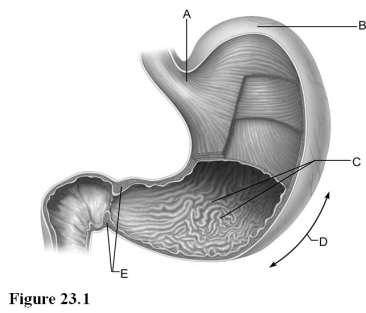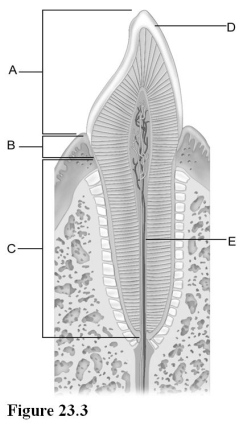A) A
B) B
C) C
D) D
E) E
Correct Answer

verified
Correct Answer
verified
Multiple Choice
Which of the following is not a characteristic of the rectum?
A) lacks tenia coli
B) has longitudinal folds called columns
C) is secondarily retroperitoneal
D) has transverse folds called rectal valves
Correct Answer

verified
Correct Answer
verified
Short Answer
The right and left hepatic ducts join to form the ________ duct.
Correct Answer

verified
Correct Answer
verified
Multiple Choice
The splenic (left colic) flexure of the colon is located within the
A) left hypochondriac region.
B) left lateral (lumbar) region.
C) right hypochondriac region.
D) right lateral (lumbar) region.
Correct Answer

verified
Correct Answer
verified
Multiple Choice
Which of the following statements about the large intestine is false?
A) It has no villi.
B) It exhibits external muscular bands called the taeniae coli.
C) It is longer than the small intestine.
D) It has haustra.
Correct Answer

verified
Correct Answer
verified
Multiple Choice
 Use the diagram above to answer the following questions.
-Identify the letter that indicates folds which allow for expansion of the stomach.
Use the diagram above to answer the following questions.
-Identify the letter that indicates folds which allow for expansion of the stomach.
A) A
B) B
C) C
D) D
E) E
Correct Answer

verified
Correct Answer
verified
True/False
From the lumen outward, the layers of the gastrointestinal tract are mucosa, submucosa, muscularis, serosa.
Correct Answer

verified
Correct Answer
verified
Multiple Choice
The vermiform appendix lies within the ________ region of the abdomen.
A) right lateral (lumbar)
B) left lateral (lumbar)
C) right inguinal
D) left inguinal
Correct Answer

verified
Correct Answer
verified
Multiple Choice
Which of the following is not a characteristic of the large intestine?
A) It includes the ascending, transverse, and descending colon.
B) It contains an abundant bacterial flora.
C) It is the main site of nutrient absorption.
D) It absorbs much of the water and salts remaining in the wastes.
Correct Answer

verified
Correct Answer
verified
Multiple Choice
The terminal portion of the small intestine is the
A) duodenum.
B) ileum.
C) jejunum.
D) pyloric sphincter.
Correct Answer

verified
Correct Answer
verified
Multiple Choice
Mucosa-associated lymphoid tissue (MALT) is primarily located within the
A) lamina propria.
B) muscularis mucosa.
C) serosa.
D) submucosa.
Correct Answer

verified
Correct Answer
verified
Multiple Choice
The splenic flexure is the boundary between the
A) spleen and stomach.
B) transverse and descending colon.
C) transverse and ascending colon.
D) descending colon and sigmoid colon.
Correct Answer

verified
Correct Answer
verified
Short Answer
The region between your teeth and lips is called the ________.
Correct Answer

verified
Correct Answer
verified
Multiple Choice
Which layer of the digestive tract is responsible for the peristaltic waves that propel materials from one portion to another?
A) muscularis externa
B) serosa
C) submucosa
D) mucosa
Correct Answer

verified
Correct Answer
verified
Multiple Choice
What is the distinction between Crohn's disease and ulcerative colitis?
A) Although both diseases are caused by inflammation, Crohn's disease occurs only in the small intestine, whereas ulcerative colitis occurs only in the large intestine.
B) Crohn's disease is caused by the bacterium H. pylori, whereas ulcerative colitis results from the failure of acid to be neutralized before it reaches the colon.
C) Crohn's disease produces deeper erosions of the mucosa and occurs throughout the intestines, whereas ulcerative colitis occurs mostly in the rectum.
D) Crohn's disease results in diverticula, caused by insufficient dietary fiber, whereas ulcerative colitis is caused by the bacterium H. pylori.
Correct Answer

verified
Correct Answer
verified
Multiple Choice
To say someone is "tongue-tied" means that the
A) lips are exceptionally immobile.
B) tongue muscles are weak.
C) salivary glands produce little lubricant.
D) lingual frenulum is short.
Correct Answer

verified
Correct Answer
verified
Multiple Choice
The digestive organ primarily responsible for the absorption of water is the
A) ileum.
B) duodenum.
C) anus.
D) large intestine.
Correct Answer

verified
Correct Answer
verified
Multiple Choice
Secretions of the parotid gland empty
A) anterior to the frenulum of the tongue.
B) between the lingual tonsil and epiglottis.
C) lateral to the upper molars.
D) through 10 ducts on the floor of the oral cavity.
Correct Answer

verified
Correct Answer
verified
Multiple Choice
 Use the diagram above to answer the following questions.
-Identify the letter that indicates the root.
Use the diagram above to answer the following questions.
-Identify the letter that indicates the root.
A) A
B) B
C) C
D) D
E) E
Correct Answer

verified
Correct Answer
verified
Multiple Choice
Junction of the transverse and ascending colon.
A) splenic flexure
B) cecum
C) hepatic flexure
D) ileocecal valve
E) haustra
Correct Answer

verified
Correct Answer
verified
Showing 21 - 40 of 113
Related Exams